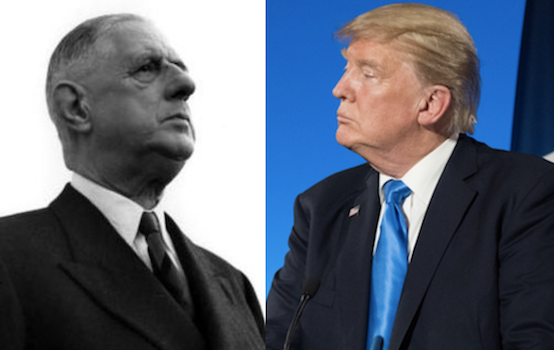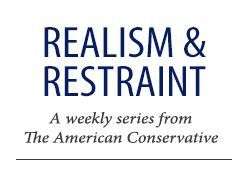
Renowned French philosopher Henry Bergson was a leading Western thinker who challenged the notion that all occurrences can be explained by rationalism, scientific determinism, a priori reasoning, or “frozen doctrines.” He stressed instead the importance of intuition and instincts in the shaping of our reality.
According to Julian Jackson’s majestic biography of Charles de Gaulle, A Certain Idea of France, the legendary French leader was a fan of Bergeson, and explained once to an American journalist that when it comes to producing great statesman, intelligence alone was not sufficient.

“The intelligent man does not automatically become a man of action,” de Gaulle stipulated. “Instinct is also important.” He then explained that the reason French President Henri Poincaré was overshadowed by Prime Minister George Clemenceau during the Great War was that the former was “a man of texts, a mechanically organized intelligence” who believed in “texts, messages, proclamations” and interacted only with ministers and diplomats, while the latter adhered to the “ferocious law of the species” when it came to issues of war and peace.
To put it in contemporary terms, if Paris had been filled with think tanks in 1940, and French leaders were to ask the advice of their best and the brightest, it would have been more likely than not that based on rational and cost-benefit analysis, most of what constituted the “Blob” of that time would have advised the French leadership to seek a ceasefire with the Germans, negotiate a deal with Adolph Hitler, and make the best out of it. Propelled by his instinct and impulse, De Gaulle begged to differ with France’s decision makers, and the rest, as they say, is history.
Advertisement
In fact, what came to be known as “Gaullism” was in a way a product of “Bergsonism.” Gaullism is not a doctrine or an ideology. It’s a pragmatic policy approach to protecting and advancing the national interest that can only be pursued by statesman driven by the right mix of intelligence and intuition, cold reason and emotional impulse.
This explains why it was sometimes seen as lacking abstract reasoning, consistency, and coherence. President Trump’s foreign policy position and posturing have elicited much of the same complaints.
Like: “President Trump, you pledged to get us out of the Middle East. But what about your decision to revoke the nuclear deal with Iran and declare an economic war against Tehran? You argued that a nuclear North Korea would be an existential threat to the United States. So what about your bromance with its evil leader? You are seeking to improve America’s relationship with Russia. Then what about withdrawing from the nuclear missile accord with Moscow? You decried the policy of regime change and nation building. What about your call for doing just that in Venezuela?”
Let’s make one thing clear: Trump is no de Gaulle, and for a very simple reason: De Gaulle insisted that his model statesman possess both intuition and intelligence. Intelligence in that case referred not only to high IQ but also to intellectual curiosity, a sense of history, and a comprehensive view of the world that can only be acquired by studying and reading a lot of books.
Yet it’s clear that, unlike de Gaulle and the ultimate American Gaullist, President Richard Nixon—for whom spending time going through tomes written by the Greeks and the Romans was considered to be a form of light reading—Trump has never shown any comparable intellectual curiosity.
But then when we try to deconstruct what we take to be Trump’s foreign policy, it seems that the president’s intuition and instincts, or the “following his guts,” explain major phenomena. The impulse to “do something” in response to this or that foreign policy crisis, which led his predecessors into military quagmires, has kept the White House occupant in neutral.
To put it differently, Trump has embraced President Barack Obama’s “Don’t do stupid shit” foreign policy. Yet he seems to be doing a much better job of implementing that advice by more forcefully resisting the unrelenting pressure from the interventionist “Blob” (knock on wood).
So Trump, who has been ridiculed by members of the so-called intellectual elite as a lightweight, has refused to give a green light to a U.S. military intervention in Syria, rejecting the advice of those who would pursue another regime change there.
It is true that his diplomacy with North Korea and his friendship with its dictator has not brought about the denuclearization of the Korean Peninsula. But then no one seriously believed that was going to happen under any scenario. From that perspective, Trump has helped avert a catastrophic war in the area and encouraged reconciliation between the North and the South, which could one day lead to a united Korea that would no longer require U.S. troops to protect it.
It may not be the Grand Strategy that members of Washington’s foreign policy establishment are looking for. But Trump’s decisions have already set the stage for long-term strategic changes in East Asia, where an evolving Korean nationalism countered by a sense of Japanese nationalism could help create a new and stable regional balance of power that would make direct U.S. military intervention unnecessary.
In the Middle East, by firing John Bolton, expressing a willingness to meet with his Iranian counterpart, and refusing to drag the U.S. into military conflict with Iran in the aftermath of the attacks on the Saudi oil installations, Trump has sent a clear message to the Saudis that they need to pursue a détente with Tehran. The U.S. will not intervene in a war between the Sunnis and the Shiites in the Middle East. Period. And take it from there.
Then there is the message he is sending to a leading player in the Middle East, Turkey, and another regional actor down on the scale, the Kurds, with his recent announcement that he’s ending U.S. involvement in Syria. It’s not much different than his message to Israel and the Palestinians: hey guys, you need to resolve your differences among yourselves—we can only help. Regional powers like Turkey and Israel—and in the long run, Iran—will be able to maintain spheres of influence in order to protect their security and as part of any evolving balance of power, and minor players, like the Kurds and the Palestinians, will have to accept that.
Unfortunately, notwithstanding all his bragging, a “stable genius” Trump is not. He has not surrounded himself with foreign policy aides who fit that bill, the result being that while he has not done any “stupid shit,” he has failed to move ahead by actively reorienting American foreign policy in a non-interventionist direction. And in some cases, like on Iran and China, he has yet to figure out how to resolve the contradictions that his policies bring to the surface.
So while Trumpism may not be Gaullism, it still makes much more sense than the numerous doctrines and grand strategies that have guided America since the end of the Cold War. Those presidents were men “of texts, a mechanically organized intelligence,” but that didn’t mean their foreign policies turned out to be successful.
Leon Hadar, a TAC contributing editor, writes regularly for National Interest Online, Asia Times, Haaretz, and Quillette.
Sourse: theamericanconservative.com






